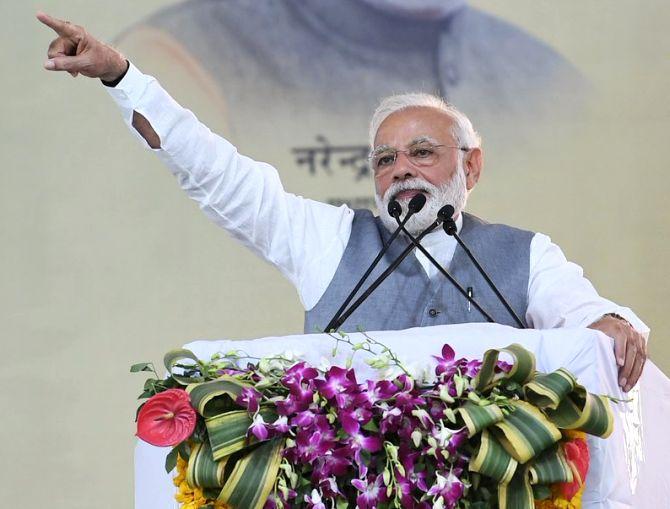 | « Back to article | Print this article |
'But that does not make him weaker than his adversaries.'

"People are able to measure the distance between what has actually been achieved and what was promised -- and that does not put the PM in a position of strength," says Professor Gilles Verniers, author of two publications on Uttar Pradesh politics and assistant professor of political science at Ashoka University.
"But the question is whether this disenchantment is strong enough to detach voters from the BJP and get them to vote elsewhere," he tells Rediff.com's Archana Masih in the concluding part of an interview discussing the crucial BSP-SP alliance, the sameness of the BJP's electoral formula and the political dynamics of UP.
Is patriotism going to decide this election?
Indian voters are very smart and it is very rare that they will vote on a single issue.
No doubt, Pulwama and Balakot is an important electoral issue in favour of the BJP, but I don't think it will be a substitute to other issues that affect people's lives like joblessness, access to education, health, farmers's distress.
It is yet another campaign issue which clearly favours the BJP, but it will be mingled with many other considerations grounded into local realities.
Last time the Modi wave secured 71/80 seats in UP for the BJP -- that tally is expected to reduce with the BSP-SP alliance -- but Mr Modi's popularity is high, what will the Modi effect be this time?
Modi's popularity is still high.
Many people credit him for at least trying to do good. But people now have an opportunity to measure the distance between old promises and realisation.
4-5 years ago, he promised to transform UP into Gujarat, but by almost any measure, the situation in UP is worse than it was 4 years ago in terms of economic development, law and order, caste and communal violence. So there will be many who will hold him accountable for the promises made
The question is whether this disenchantment is strong enough to detach voters from the BJP and get them to vote elsewhere.
One rhetoric that works for the BJP is that voters are asked to vote for the national leadership and they have to choose between national parties and state-based parties.
Akhilesh-Mayawati for UP, but Modi for the nation remains a strong argument.
Mayawati's popularity remains very strong with her base, Akhilesh's too -- these are two parties with strong organisations and resources.
One does not see a wave in favour of the BJP like in 2014.
The Congress has not lost a back to back election since 1998-1999, what happens to the party and the family if it were to lose another?
A party is never really dead in Indian politics. A party can sustain itself with microscopic vote share and some faithful family strongholds.
It can go on like this for a very long time. It is up to the Congress to decide if they want to transform themselves.
They have been punished by the electorate repeatedly in UP. It has had very little effect so far in terms of transformation of organisational culture.
I don't see any dramatic change in the Congress party should they face yet another defeat.
There is an interesting precedent in a party that could not perform in elections -- the Jan Sangh. It merged with the Janata coalition in 1977 and took a break for a few years to introspect and reinvent itself. In the process, it did not even need a change in leadership.
The BJP was reborn with basically the same leaders -- L K Advani, Atal Bihari Vajpayee and Murli Manohar Joshi who used the time to ponder and think to change that losing streak. They did that very successfully.
In 2014, Modi was a three term chief minister contesting his first Lok Sabha election to become prime minister. In 2019, he is fighting to retain his office -- what differences do you see in him since then?
I don't see much change. A lot of strength for the PM and the BJP comes from the RSS which is a rather unchanging organisation.
The political style, rhetoric hasn't changed. From development for all, this time it is more about welfare and nationalism, but it is the same formula.
This is also an advantage that the BJP presents -- consistency, cohesiveness and solidity in front of the electorate.
It also depicts political cleverness, cunningness, sense of purpose, rarely seem in Indian politics.
The energy they deploy in any and every election really has no precedent -- whether you agree or disagree with their purpose or not.
It is the same old recipe, the same old formula that has worked for him, so why change?
Does the prime minister's position seem stronger than it was 5 years ago?
I wouldn't say that because he had a term that gave him opportunities to fulfill his promises.
Earlier, he had to create a link between expectation and promises which is a comparatively easier thing to do. Now he has to create a link between promises and achievement.
People are able to measure the distance between what has actually been achieved and what was promised -- and that does not put the PM in a position of strength.
The PM is in a weaker position compared to 2014, but that does not make him weaker than his adversaries.
Very few of his adversaries actually display a strength of their own with the exception of some regional parties.
How will the BJP's fortunes in UP be this time?
My sense is it is going to perform anyhow.
In every election there are 16 to 20 factors that work against the BJP, but the BJP seems to overcome it.
Their ability to mobilise cannot be underestimated -- their ability to canvass, its limitless resources, the charisma of the PM etc.
It remains a formidable machinery. I won't be surprised if their vote share does not drop significantly in UP.
There is a large floating population that has been voting in variation in UP. It is the floating electorate the decide the outcome of an election.
These voters don't have affiliation to any party and decide who they will vote for at the last moment.
Where do you see the Muslim voter in this election?
There is no such thing as the Muslim voter. There are Muslim voters and they are as strategic as other groups in UP or India.
There has been a long strategy of voting for the candidate that has the best chance of defeating the BJP. That is again going to work very strongly.
I would expect the Muslim voters to provide a lot of support to the alliance -- the old risk of votes splitting between the SP-BSP and the Congress has greatly reduced by the presence of the alliance.
The Congress also receives votes from Muslims in UP, fairly marginal, but Muslims will massively support the alliance.

This has effectively become a two party contest in UP which will benefit the BJP, don't you think?
Realistically, the consideration of a fragmented Opposition is a better scenario for the BJP.
Bipolar fights are closely contested because 2 to 3 players dent into the base of the opponent.
In a way, the stronger the Congress is in UP, the better the chances for the BJP to win.
What impact do you see the BSP-SP alliance having on the ground this time?
It is the only strategy that makes sense for both these parties.
There is no certitude that arithmetic alone would be sufficient. The election remains open and competitive.
The question is whether the alliance will be able to gather votes outside the core base of both the parties. There is a big question mark on that at the moment.
The alliance won the recent by-elections, but the BJP vote share also increased.
So the election in UP is very open and competitive. Small distribution of votes can make the results go either way. I foresee many closely contested elections.
What will be the big themes of this election? How different is this election from elections of the past?
There is not much contrast from elections of the past. Economic questions will be at the forefront of most voters concerns -- which party is most likely to improve their economic situation and trajectory, and whether they hold the BJP responsible for lack of progress or not.
At the end of the day, daily lives matter more than generic considerations including nationalism.
There is a great sense of patriotism ingrained into people, but it is not necessarily a substitute for legitimate daily life concerns.
I would expect those concerns to be at the forefront in determining how people are going to cast their vote.